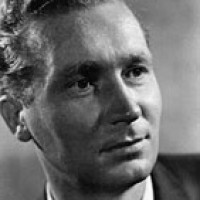Beyer was a German director and screenwriter. He worked as an assistant director and dramaturge in two local theatres. In 1952, he began studying drama in Berlin and soon transferred to directing at the FAMU in Prague. During his studies he worked as an assistant director on films produced by the Easter German film studio DEFA. He graduated in 1957 with the acclaimed
Zwei Mütter and began working for DEFA as an independent associate, which allowed him to choose his own projects. His next film
An Old Love (Eine alte Liebe, 1959) was not as successful as the first one, but
Five Cartridges (Fünf Patronenhülsen, 1960) was well accepted by both audiences and critics. He continued to deal with anti-fascist topics in
Invincible Love (Königskinder, 1962) and
Naked Among Wolves (Nackt unter Wölfen, 1963). He made a comedy
Carbide and Sorrel (Karbid und Sauerampfer, 1963), and his next film
The Trace of Stones (Spur der Steine, 1966) was banned from distribution only three days after its premiere and was not available for viewing until 1989. After that, he was forbidden to make any more films and continued his career on television and in theatre. He returned to films in 1974 with the war drama
Jacob the Liar (Jakob, der Lügner, 1974), which was the only East German film nominated for an Oscar. Shortly before finishing his film
The Hiding Place (Das Versteck, 1978) Beyer and the leading actors wrote a protest letter because the government repealed citizenship to the singer and dissident Wolf Biermann. Thus, Beyer is once again forbidden to work for the DEFA Studio and the film is banned from distribution. Shortly after his next TV film
Geschlossene Gesellschaft (1978) Beyer was forbidden from working on the East German Television and in 1980 continues his career in West Germany making TV films. In 1982, he once again directed films for DEFA; the controversial
The Turning Point (Der Aufenthalt, 1983) and
Bockshorn (1984) made in the USA and on Cuba.
After Der Bruch (1989) he directed
The Suspicion (Der Verdacht, 1991), his last DEFA film for cinema distribution. From then until 1998, he worked exclusively as a TV director.

